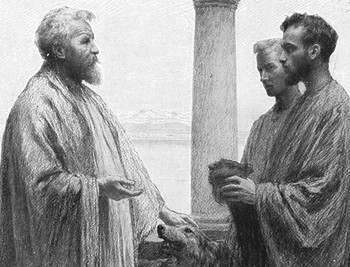"If you sit fenced off in your apathy, if you look at the stars and yawn; if you see suffering and don't cry out; if you don't praise and you don't revile, then I have created you in vain, says God." - Aaron Keitlin
The Gospel stories always have inherent and important questions: what kind of people are we; what kind of people will we be?
 As we near the end of another liturgical year we acknowledge that in the realm of faith, our leader is - now and always - Jesus Christ, who remains the perfect example of how power is a gift that is to be used for service.
As we near the end of another liturgical year we acknowledge that in the realm of faith, our leader is - now and always - Jesus Christ, who remains the perfect example of how power is a gift that is to be used for service.
The "useless" servant of this week's Gospel takes his place with the five foolish virgins, the wedding guest who gets thrown out of the wedding banquet for lack of a proper attire, the rich young man too wrapped up in himself to answer the Call, and the laborers who work all day long only to get the same pay as those hired at the final hour. These are the strange ones - thrown into "darkness outside, where there will be wailing and grinding of teeth,'" - those who didn't prepare well, those who didn't prepare at all, or those to whom much was given and who kept their gifts to themselves.
And we wonder about these folks: these are not bad people. These are not malicious people. But somehow they don't measure up. Again, we ask ourselves, what is Jesus saying to us? What is the common denominator, if any, among those who are cast into the darkness, those not worthy of the Kingdom?
In each case Jesus is concerned with our understanding of the kingdom - not just the Kingdom to come at the end of time, or the Second Coming - but the Kingdom present within and among us, here and now. The invitation to discipleship is one that is a call to build up The Kingdom in the here and now, and is not determined by our own qualifications or our own merits. The invitation is at once both a gift and a mandate.
St. Paul tells us that we are not of the night or of darkness, but that we are children of the light and children of the day. And yet, with this wonderful affirmation comes a disturbing warning: the day of the Lord will come like a thief at night. The question we need to ask ourselves is not how well we are prepared for His coming, but how well prepared we are to make an accounting of our use of the gifts we have received.
It strikes me that this might very well be what Jesus is saying to us in today's Gospel parable. So often we want to "play it safe." We bury our gifts instead of using them for the sake of the kingdom, for the sake of our brothers and sisters with whom we share this planet. We revel in our own freedom, in our faith, in the gifts of grace... but we keep them to ourselves. We are content to sit back comfortably and let someone else do the work and fight the battles. We blind ourselves to those moments in our lives when The Lord taps us on the shoulder and asks for an accounting. We might protest, along with the servant who buried his talents, that we didn't do any wrong, that we didn't hurt anyone, that we just minded our own business.
The parable suggests that Gospel living and loving require risk taking. We have to think about how we can keep our discipleship from becoming a freeze-dried package put on a high shelf for safe keeping.
The gifts of grace are not to be hoarded; they are not personal rewards. They are like seeds to be brought to flower, like yeast to permeate the whole mass, like light to drive out darkness. The parable reminds us that the faith we treasure is not frail or easily contaminated by taking it out into the market place and investing it. Instead, Christ has given us a gift that can withstand the tests the world throws at it. We are encouraged by this parable to take risks and take our faith with us into the affairs of daily life: work, school, shopping, social events and into the public forum where we must witness to what we believe.
If we are willing to be merely bystanders, we may well merit for ourselves the very harsh words of condemnation that end today's Gospel story.
Image: The Talents, Eugène Burnand





